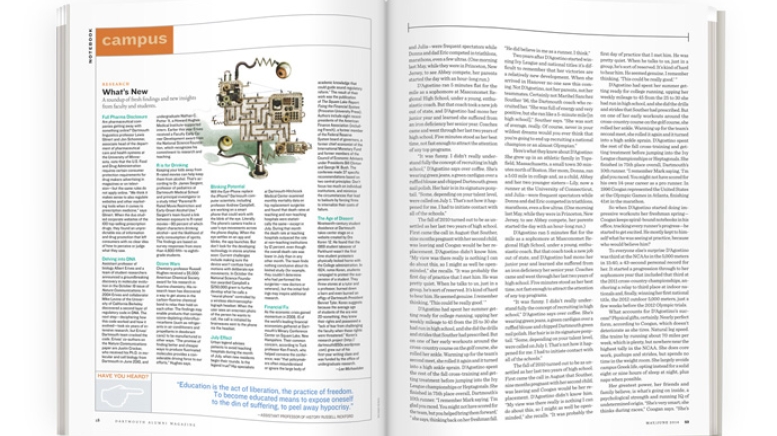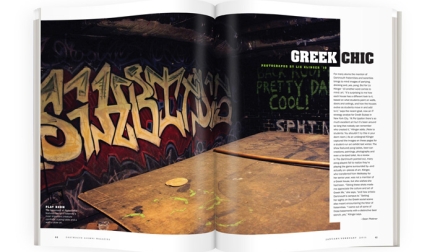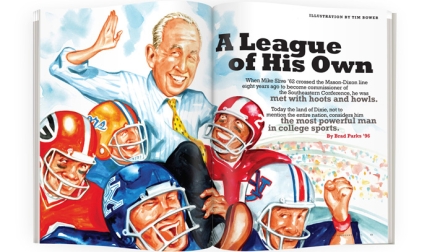Full Pharma Disclosure
Are pharmaceutical companies getting away with something online? Dartmouth linguistics professor Lewis Glinert and Jon Schommer, associate head of the department of pharmaceutical care and health systems at the University of Minnesota, note that the U.S. Food and Drug Administration requires certain consumer protection requirements for drug makers advertising in magazines or on television—but the same rules do not apply online. “We think it makes sense to also regulate websites and other marketing tools when it comes to prescription medicine,” says Glinert. When the duo studied corporate websites of the 100 top-selling prescription drugs, they found an unpredictable mix of information and drug promotion that left consumers with no clear idea of how to perceive or judge what they saw. LINK
Delving into DNA
Assistant professor of biology Albert Erives and a team of student researchers announced a groundbreaking discovery in molecular evolution in the October 19 issue of Nature Communications. In 2004 Erives and collaborator Mike Levine of the University of California Berkeley discovered a second layer of regulatory code in DNA. The next step—deciphering how this code worked and how it evolved—took six years of intensive research, but Erives’ Dartmouth team cracked the code. Erives’ co-authors on the Nature Communications paper are Justin Crocker, who received his Ph.D. in molecular and cell biology from Dartmouth in June 2010, and undergraduate Nathan C. Potter ’11, a Howard Hughes Medical Institute-supported intern. Earlier this year Erives received a Faculty Early Career Development award from the National Science Foundation, which recognizes his commitment to research and teaching. LINK
R is for Drinking
Keeping your kids away from R-rated movies can help keep them from alcohol. That’s according to Dr. James Sargent, professor of pediatrics at Dartmouth Medical School and principal investigator in a study titled “Parental R-Rated Movie Restriction and Early-Onset Alcohol Use.” Sargent’s team found a link between exposure to R-rated movies—90 percent of which depict characters drinking alcohol—and the likelihood of early consumption of spirits. The findings are based on survey responses from more than 4,600 fifth- to eighth-grade students. LINK
Ozone Wars
Chemistry professor Russell Hughes received a $5,000 American Chemical Society award for his research in fluorine chemistry. His research team has discovered a way to get atoms in the carbon-fluorine chemical bond to relax their hold on each other. The findings may enable products that contain ozone-depleting chlorofluorocarbons (such as refrigerants in air conditioners and propellants in deodorant cans) to be manufactured in other ways. “The promise of finding better and cheaper ways to produce fluorinated molecules provides a considerable driving force to our efforts,” Hughes says. LINK
Blinking Potential
Will the Eye-Phone replace the iPhone? Dartmouth computer scientists, including professor Andrew Campbell, are working on a smart phone that could work with the blink of the eye. Literally. The phone’s camera tracks a user’s eye movements across the phone display. When the eye settles on an app and blinks, the app launches. But don’t look for the developing technology in stores anytime soon: Current challenges include making sure the device won’t confuse hand motions with deliberate eye movements. In October the National Science Foundation awarded Campbell a $250,000 grant to further develop what he calls a “neural phone” controlled by a wireless electroencephalograph headset. When the user sees an onscreen photo of the person he wants to call, the call is initiated by brainwaves sent to the phone via the headset. LINK
July Effect
Urban legend advises patients to avoid teaching hospitals during the month of July, when new residents begin their rounds. Is the legend true? Hip specialists at Dartmouth-Hitchcock Medical Center examined monthly mortality data on hip replacement surgeries and found that death rates at teaching and non-teaching hospitals were statistically the same—except in July. During that month the death rate at teaching hospitals outpaced the rate at non-teaching institutions by 12 percent, even though the overall death rate was lower in July than in any other month. The team finds nothing conclusive about its limited study (for example, they couldn’t determine who had performed the surgeries—new doctors or veterans), but the initial findings may inspire additional research. LINK
Financial Fix
As the economic crisis gained momentum in 2008, 15 of the world’s leading financial economists gathered at Dartmouth’s Minary Conference Center on Squam Lake, New Hampshire. Their common concern, according to Tuck professor Ken French, who helped convene the conference, was “that policymakers often misunderstand or ignore the large body of academic knowledge that could guide sound regulatory reform.” The result of their work was the publication of The Squam Lake Report: Fixing the Financial System (Princeton University Press). Authors include eight recent presidents of the American Finance Association (including French), a former member of the Federal Reserve System board of governors, a former chief economist of the International Monetary Fund and former members of the Council of Economic Advisers under Presidents Bill Clinton and George W. Bush. The conferees made 37 specific recommendations based on two central principles: Don’t focus too much on individual institutions, and minimize the circumstances that lead to bailouts by forcing firms to internalize their costs of failure. LINK
The Age of Dissent
Nineteenth-century student dissidence at Dartmouth takes center stage on a website created by Ore Koren ’12. He found that the 1969 student takeover of Parkhurst wasn’t the first time student protesters physically locked horns with the College administration. In 1824, notes Koren, students rampaged to protest the suspension of a student. They threw stones at a tutor and a professor, burned down a barn and even burned an effigy of Dartmouth President Bennet Tyler. Koren suggests because the average age of students of the era was 20-something, they knew their rights and possessed a “lack of fear from challenging the faculty when these rights were threatened.” Koren’s research project (http://dartmouth1850s.wordpress.com) grew out of his first-year writing class and was funded by the office of undergraduate research.
—Lee Michaelides




